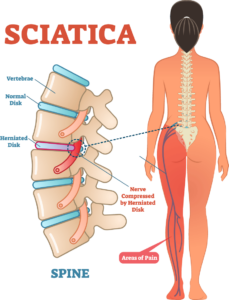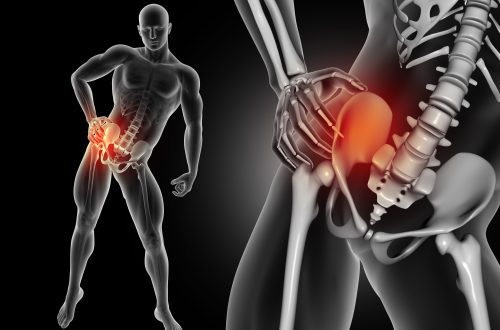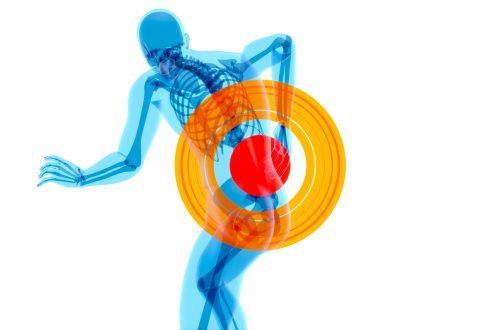While sciatica and constipation may seem unrelated, there is a surprising connection between these two conditions. Many people experiencing chronic constipation report increased sciatic nerve pain, leading to questions about how these conditions influence each other.
Understanding the Relationship
Constipation and sciatica can be interconnected due to their proximity in the body and the pressure that built-up waste can place on surrounding nerves and tissues. While constipation doesn’t directly cause sciatica, it can exacerbate existing sciatic nerve pain or create symptoms that mimic sciatica.
How Constipation Affects the Body
When you’re constipated, waste material builds up in your colon and intestines, leading to:
- Increased pressure in the lower abdomen
- Bloating and discomfort
- Inflammation in the digestive tract
- Strain on surrounding muscles and tissues
- Potential pressure on nearby nerves
Impact on Sciatic Nerve Pain
The sciatic nerve runs from your lower back through your hips and buttocks and down each leg. Constipation can affect this area in several ways:
- Direct Pressure: Accumulated waste material can put pressure on the sciatic nerve or surrounding tissues.
- Muscle Tension: Straining during bowel movements can cause muscle tension in the lower back and pelvic area.
- Inflammation: Chronic constipation can lead to increased inflammation in the body, potentially affecting nerve sensitivity.
Common Symptoms When Both Conditions Coexist
When constipation impacts sciatic nerve pain, you might experience:
- Increased lower back pain
- Sharp, shooting pain down one or both legs
- Numbness or tingling in the legs or feet
- Difficulty sitting or standing comfortably
- Worsening pain after long periods of constipation
Prevention and Management Strategies
Managing both conditions requires a comprehensive approach focusing on lifestyle changes and proper medical care.
Dietary Modifications
- Increase Fiber Intake:
- Eat more fruits and vegetables
- Include whole grains in your diet
- Add legumes and beans to meals
- Consider fiber supplements when needed
- Stay Hydrated:
- Drink plenty of water throughout the day
- Limit caffeine and alcohol intake
- Include hydrating foods in your diet
Physical Activity
Regular exercise helps prevent both conditions by:
- Promoting healthy bowel movements
- Strengthening core muscles
- Improving flexibility
- Reducing inflammation
- Maintaining proper spine alignment
Proper Posture and Body Mechanics
- Sitting Habits:
- Use proper lumbar support
- Take regular breaks from sitting
- Maintain good posture while working
- Movement Techniques:
- Lift objects properly
- Avoid twisting movements
- Practice good body mechanics
Medical Interventions
When self-management isn’t enough, several medical interventions can help:
For Constipation:
- Over-the-counter remedies:
- Stool softeners
- Gentle laxatives
- Fiber supplements
- Prescription medications:
- Prescribed laxatives
- Motility agents
- Other digestive aids
For Sciatica:
- Pain management:
- Anti-inflammatory medications
- Physical therapy
- Nerve pain medications
- Professional treatments:
- Chiropractic care
- Massage therapy
- Acupuncture
When to Seek Medical Help
Consult a healthcare provider if you experience:
- Severe or persistent pain
- Loss of bowel or bladder control
- Numbness in the genital area
- Fever or unexpected weight loss
- Pain that significantly impacts daily activities
Long-term Management
Managing both conditions long-term requires:
- Regular Health Monitoring:
- Track bowel movements
- Monitor pain levels
- Note trigger factors
- Lifestyle Adjustments:
- Maintain a healthy diet
- Exercise regularly
- Practice stress management
- Get adequate sleep
- Preventive Measures:
- Regular check-ups
- Early intervention when symptoms appear
- Consistent healthy habits
Understanding Risk Factors
Several factors can increase the likelihood of experiencing both conditions:
- Sedentary lifestyle
- Poor diet
- Dehydration
- Certain medications
- Underlying health conditions
- Age and genetics
Conclusion
While constipation doesn’t directly cause sciatica, it can significantly impact sciatic nerve pain and overall comfort. Understanding the connection between these conditions helps in developing effective management strategies. By maintaining healthy bowel habits, staying active, and addressing symptoms early, you can minimize the impact of both conditions on your daily life.
Remember that everyone’s experience with these conditions is unique, and what works for one person may not work for another. Working with healthcare providers to develop a personalized management plan is often the most effective approach to addressing both constipation and sciatic pain.





